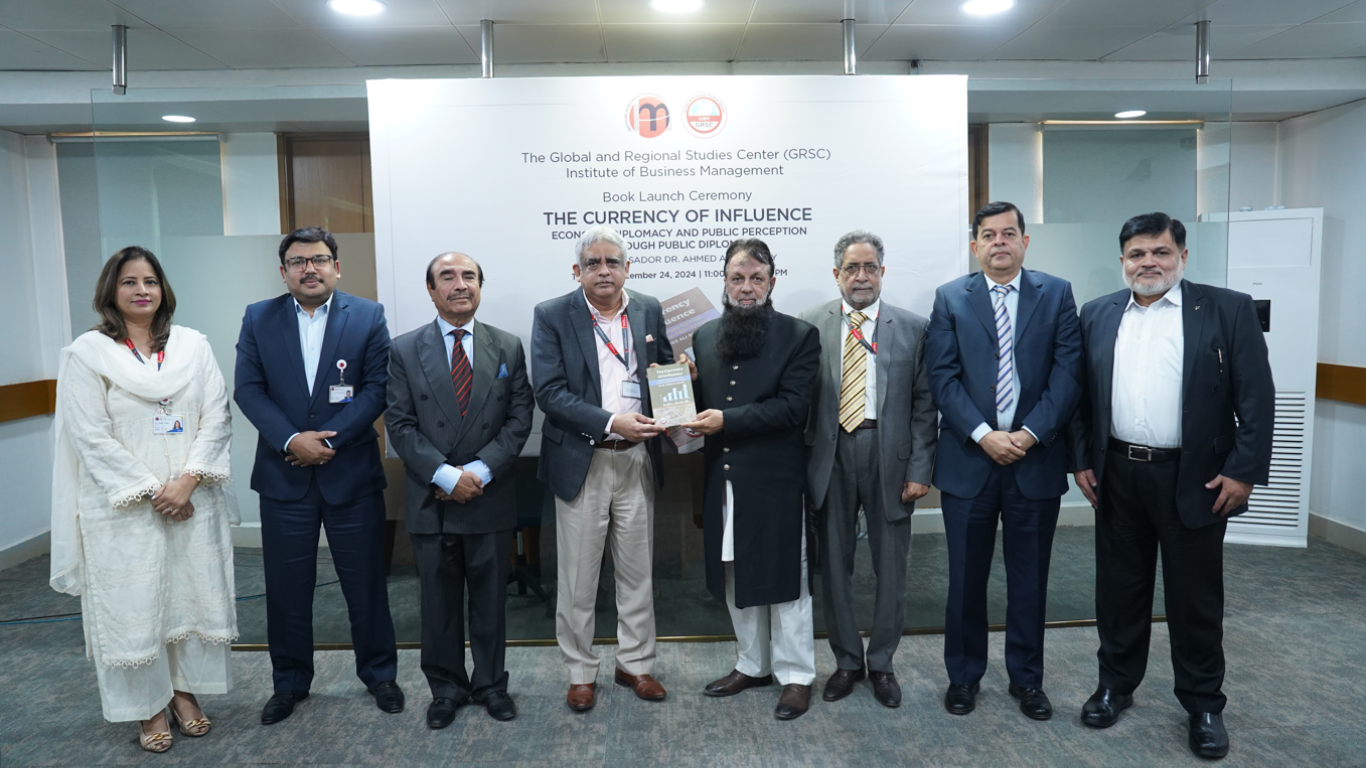
The Global Research & Studies Center (GRSC) at the Institute of Business Management (IoBM) hosted the launch of Dr. Ahmed Ali Sirohey's book, “The Currency of Influence: Economic Diplomacy and Public Perception through Public Diplomacy”, on December 24, 2024. The launch brought together experts, diplomats, and academicians, underscoring the importance of fostering dialogue in public diplomacy. Ambassador G. R. Baluch, Director of GRSC, IoBM moderated the session. Ambassador M. Alam Brohi and Ambassador Hasan Habib served as reviewers, offering valuable insights into the book's themes and its relevance to contemporary economic and public diplomacy. The event was attended by IoBM’s Deans, Management, Faculty and students.
During his address, Mr. Talib S. Karim, President of IoBM, emphasized the importance of soft diplomacy, stating that it plays a pivotal role in fostering people-to-people connections, academic collaborations, and sports exchanges, areas where politics should remain absent. He acknowledged the growing challenges faced by Pakistan's diplomats, primarily due to the country's economic constraints, which limit its ability to influence global superpowers. "The global acceptance of our passport is declining, making foreign service increasingly demanding," he remarked. Mr. Karim also announced that Ambassador Sirohey’s book will be added to IoBM’s collection, providing valuable insights for students pursuing international relations and diplomacy.
Earlier, in his remarks, Ambassador G. R. Baluch provided a thoughtful overview of the book, highlighting its significance as a comprehensive case study for students and professionals of foreign services. He praised Ambassador Sirohey's illustrious career, characterized by self-motivation, decisiveness, and an exceptional work ethic, which firmly establishes him as a distinguished figure in the field of diplomacy. Ambassador Baluch also commended the book's emphasis on creativity, a human touch, and innovative, out-of-the-box approaches to addressing diplomatic challenges facing Pakistan.
Addressing the audience, Ambassador Sirohey shared that the book represents the culmination of his diplomatic career, documenting his experiences, results, and insights. He highlighted that the primary objective of public diplomacy is to win the hearts and minds of the host government and its citizens, noting that positive engagement plays a crucial role in influencing government decisions and aligning diplomatic efforts with embassy goals. Reflecting on his tenure as Pakistan's ambassador to Niger, Ambassador Sirohey shared initiatives aimed at projecting a positive image of Pakistan. He celebrated Eid with orphans, prioritized women’s empowerment, and distributed books to promote education. Additionally, he demonstrated personal commitment by sacrificing a portion of his salary to host guests at his home, without burdening the government.
Ambassador Hassan Habib provided a chapter-wise summary of the book, highlighting Ambassador Sirohey's detailed exploration of the mechanisms of diplomacy and the pivotal role of foreign services in ensuring national security and effective diplomacy. Ambassador Habib emphasized the significance of the chapter on the "human touch" in public diplomacy, noting that it underscores the importance of foreign service officials fostering meaningful connections with the public. He added that the book will be an essential read for the new entrants in public diplomacy.
Dr. Shahid Amjad presented Ambassador Brohi's review, who was unable to attend. His review highlighted the challenges of living in a globally interconnected world where tourists, refugees, terrorists, emails, and greenhouse gases transcend borders. "We must accept the world as it is, not as we wish it to be," remarked Ambassador Brohi, emphasizing that the stark realities of the modern era are reshaping state diplomacy. He underscored Pakistan's shortcomings in addressing misconceptions perpetuated by adversarial forces, stressing that one of the key roles of diplomacy is to rectify such misunderstandings. This, he argued, requires continuous engagement, open communication, and sustained dialogue. Ambassador Brohi praised the book as a comprehensive treatise, noting that its parameters and tools provide foreign service cadets with a well-outlined strategy for navigating the complexities of modern diplomacy. He called for Pakistan to adopt rigorous efforts to strengthen its diplomatic outreach and public image on the global stage.